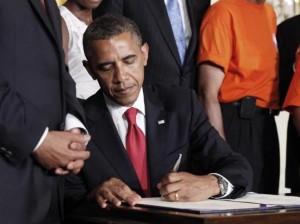
Washington— Flanked by unemployed construction workers, President Barack Obama signed a bill allowing more than $100 billion to be spent on highway, mass transit and other transportation programs during the next two years.
He said the bill “should make a real difference in the lives of millions of workers, keeping those working already on the job, and creating new jobs for unemployed workers.”
Several union leaders in the construction trades praised Obama and Congress for putting aside partisan issues long enough to get the bill passed within 24 hours of a deadline that would have prevented the funds from being authorized.
The bill will support millions of jobs fixing deteriorating roads, bridges and transit systems, and help restore certainty to the struggling construction industry.
A key element in working through the legislation was the Obama administrations success in working out a deal to jump start the Keystone XL pipeline to transport oil and natural gas from Canada, Montana and the Dakotas to refineries in the gulf coast. Construction unions had negotiated a Project Labor Agreement for the pipeline, which is expected employ several thousand workers.
But the project stalled over environmental issues in Nebraska where the state’s governor and lawmakers were concerned that a leak could contaminate the Ogallala aquifer, an underground sea a thousand miles wide from South Dakota to Texas. The aquifer provides water for thousands of towns and farms in the Midwest and the Obama administration joined Nebraska officials in opposing the pipeline’s original route over the aquifer.
In recent weeks the administration and the Canadian company building the pipeline reached an agreement to take the pipeline several hundred miles east around the aquifer and down to the coast.
Operating Engineers President James Callahan called the transportation bill, “The nation’s most important jobs bill this year. This is welcome news to Operating Engineers and thousands of other construction workers.”
Callahan said unemployment in the construction industry had reached more than 27 percent by Feb. 2010, and is still over 14 percent.
Sean McGarvey, President of the AFL-CIO Building and Construction Trades Department, said the highway bill would begin to address the nation’s unemployment crisis, as well as its infrastructure woes.
“ With significant infrastructure needs and unacceptable levels of unemployment in the construction sector, the enactment of this important legislation represents a significant achievement that ends years of costly extensions, and prepares the foundation for a long-term surface transportation bill.” McGarvey said.
“For men and women in the construction industry, who have been battling Depression-era levels of unemployment, passage of this bill will be a lifeline,” said Laborers’ President Terry O’Sullivan.
“By insuring multi-year investment, it will help restore the certainty needed to launch long-term projects. And for the nation, this is a step toward fixing our roads, bridges and transit systems that were once the envy of the world.”
He noted that while passage of the bill – the single largest piece of job-creating legislation in the country – is an historic milestone, much work remains to be done. America’s bridges, for example, are on average 43 years old – dangerously close to the 50-year average bridge lifespan. One in four bridges is deficient or obsolete and a fourth of roadways are in poor condition.
The American Society of Civil Engineers, whose research is the basis for much of the nation’s construction work, praised the bill’s passage.
Andrew Hermann, president of the society, said, “This legislation is a critical shot-in-the-arm for our nation’s transportation network. But it is only a first step. We are not investing nearly enough to bring our roads, bridges and transit systems to an acceptable condition that will serve our economy in the long run.”

